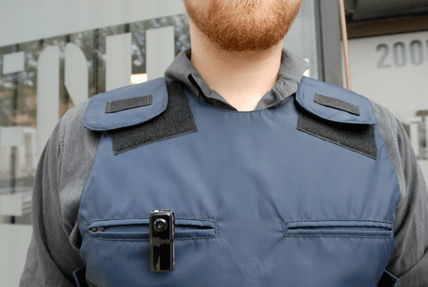
More and more communities are requiring police officers to wear body cameras to record on-the-job interactions with the public.
Tensions between African American communities and local police authorities have risen dramatically in cities across the country—from Ferguson, Missouri, to New York City, to Baltimore, Maryland. Following the funeral of Freddie Gray, who died from an injury received while in police custody, President Barack Obama expressed his frustration over the deaths of blacks at the hands of police. Calling it a “slow-rolling crisis,” he noted that the underlying reasons for the unrest in Baltimore were “not new.” What has changed, he added, is that “there’s new awareness as a result of cameras and social media.” While criticizing the criminal behavior of rioters whose senseless violence distracts from legitimate protests, Obama urged Americans to address the root causes of “deep-seated problems that spur violence.” The president lamented the lack of investment in minority communities and called for criminal justice reform, job training, and early education.
Recent protests against injustices perpetrated by police have centered around the theme “Black Lives Matter,” with its demand that African Americans no longer be routinely treated as if their lives don’t. Many underlying problems afflict many communities—poverty and unemployment, crime and incarceration, economic segregation and income inequality. Racism is only one aspect of the crisis. But with every new incident of police overreach or brutality—or the allegation of it—the likelihood of volatile confrontations and the threat of civil unrest increase.
A recent poll indicates that the vast majority of Americans expect more such racial disturbances to occur. The severity of the long-standing problems makes it unlikely they will be resolved soon or easily. So what can be done? Leaders such as Urban League president Marc Morial and former New York Police Department Commissioner Bernard Kerik point to the need for, among other things, improved police-community relations and for criminal justice reforms. Such steps might include more widespread use of body cameras by the police, to ensure accountability, and alternatives to incarceration for first-time nonviolent offenders. For the sake of public safety, the need to establish trust and show respect—for citizens’ rights as well as for legitimate police authority—is crucial.
Image credit: © Henry Stancu/Toronto Star via Getty Images
Related Links
- Obama Says He’s Frustrated over “Slow-Rolling Crisis” of Black Deaths in Police Custody
This article discusses the remarks by President Obama in the wake of the unrest in Baltimore.
(Source: Associated Press, April 28, 2015) - Lawmakers Say Tensions between Police, African-American Communities Aren’t Going Away Soon
Political leaders weigh in on the policing crisis facing African American communities; includes a photo gallery of Baltimore protests.
(Source: CNN, May 3, 2015) - “Black America Is in Crisis”: Urban League President
This article focuses on the larger social and economic crisis of which policing is just one part; includes a video statement by Marc Morial, head of the Urban League, upon release of the league’s State of Black America annual report.
(Source: CBS News, March 19, 2015) - Black Lives Matter
This opinion piece by noted columnist Walter E. Williams applies a commonsense approach to the issue of individuals’ relationship to police authority, out of concern for the law-abiding majority of the black community.
(Source: Townhall.com, May 6, 2015)



